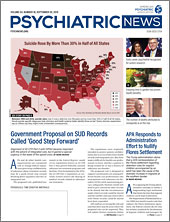There are many societal problems in the United States that I believe are emblematic of the failure of our mental health system to provide treatment to those who need it. Chief among these are the mass incarceration of people with mental illness and homelessness.
The number of public psychiatric beds in this country has declined by 96% since the mid 1950s; at that time, there were 340 psychiatric beds per 100,000 population. Then came along the widespread use of the first generation of antipsychotic agents. Many welcomed this revolution, which enabled psychiatrists to provide effective treatments to their patients. Little did anyone foresee that the introduction of new medications would eventually lead to the transinstitutionalization of our patients into jails and prisons.
Those old asylums were often overcrowded and understaffed. They were troubled environments for many patients who were “locked” not only into their psychoses but away from society and their families. Many clinicians felt these hospitals were not effective treatment or rehabilitative environments—neither did many state officials who wanted to close these hospitals and reduce taxpayers’ cost. The anti-asylum movement was born.
When Congress enacted Medicaid in 1965, it did not want to relieve states of the financial burden of providing hospitalization for people with mental illness. What resulted was the Institution for Mental Diseases (IMD) exclusion, the discriminatory federal rule that prohibits reimbursement to states for adult patients receiving psychiatric or substance use treatment in these types of facilities. And so began the era of deinstitutionalization. Unfortunately, the money did not follow the patients into their communities to provide the treatment, programs, and housing required by people with serious mental illness. And insurance coverage for treatment of mental illness could not replace the loss of funding or cover the needed ambulatory services.
The not-for-profit general hospitals began to fill some of the need for acute psychiatric care as state hospitals downsized. After about 20 years, the for-profit behavioral managed care industry was born. There may well have been some excessive and unnecessary hospitalizations in these acute-care hospitals, but onerous utilization review using unvalidated and often secret medical necessity criteria led to frequent denials of needed care and reduced payment of hospital stays. The poor fiscal viability of psychiatric units led to their downsizing or closure throughout the United States.
We now have about 110,000 psychiatric beds in our country, or 32 beds per 100,000 population. How does this compare with other developed countries? France has 90 beds per 100,000, Germany 128, and the United Kingdom 46. The generally accepted “minimum” number of needed beds is between 50 and 60 beds per 100,000 population. Our low bed numbers are not because U.S. psychiatrists are so much better than Europe’s or because our population is so much healthier. Who really pays the price for the inadequate number of psychiatric beds in our country? People with serious mental illness. And where do they end up? In jails and prisons because our asylums are mostly gone, and acute psychiatric units must treat and release patients as fast as they can. Perhaps if you count 35% to 45% of incarcerated people who have serious mental illness and a sizable percentage of people living in homeless shelters and on the streets of our cities, maybe then you could say we have enough psychiatric beds. Other nations have avoided transinstitutionalization and homelessness of people with mental illness because they preserved much more inpatient capacity than did the United States. And many countries provide some form of national health insurance to their residents.
So what can be done? APA is pressuring the Department of Health and Human Services and the Centers for Medicare and Medicaid Services to increase funding for inpatient services to make them financially viable. We are establishing a work group to develop criteria for continued stays in acute care so we can better fight arbitrary denials of care by insurance companies.
These steps don’t constitute the whole solution to ending the incarceration and homelessness of mentally ill people, but they are an important start. We need to be able to treat people until they are able to function effectively in the community, and we need increased funding for community programs to ensure that they can continue to do so. ■

